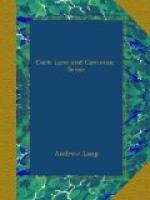In the Proceedings of the Psychical Society (part xiv. p. 477) the late General Campbell sends, from Gwalior House, Southgate, N., April 27, 1884, a tale of personal experiences and actions, which exactly reproduces the story of the Egyptian Scribe. The narrative is long and not interesting, except as an illustration of survival,— in all senses of the word.
General Campbell says that his wife died in July, 1882. He describes himself as of advanced age, and cautious in forming opinions. In 1882 he had never given any consideration to ’the subject of ultra-mundane indications’. Yet he recounts examples of ’about thirty inexplicable sounds, as if inviting my attention specially, and two apparitions or visions, apparently of a carefully calculated nature, seen by a child visitor, a blood relation of my late wife, whom this child had never seen, nor yet any likeness of her’. The general then describes his house, a new one, and his unsuccessful endeavours to detect the cause of the knocks, raps, crashes, and other disturbances. Unable to discover any ordinary cause, he read some books on ‘Spiritualism,’ and, finally, addressed a note, as the Egyptian Scribe directed a letter, to the ‘agent’: {4} Give three raps if from my deceased wife!
He was rewarded by three crashing sounds, and by other peculiar phenomena. All these, unlike the scribe, he regarded as sent ’for my particular conviction and comfort’.
These instances prove that, from the Australian blacks in the Bush, who hear raps when the spirits come, to ancient Egypt, and thence to Greece, and last, in our own time, and in a London suburb, similar experiences, real or imaginary, are explained by the same hypothesis. No ‘survival’ can be more odd and striking, none more illustrative of the permanence, in human nature, of certain elements. To examine these psychological curiosities may, or may not, be ‘useful,’ but, at lowest, the study may rank as a branch of Mythology, or of Folklore.
It is in the spirit of these sciences, themselves parts of a general historical inquiry into the past and present of our race, that we would glance at the anecdotes, legends, and superstitions which are here collected. The writer has been chiefly interested in the question of the Evidence, its nature and motives, rather than in the question of Fact. It is desirable to know why independent witnesses, practically everywhere and always, tell the same tales. To examine the origin of these tales is not more ‘superstitious’ than to examine the origin of the religious and heroic mythologies of the world. It is, of course, easy to give both mythology, and ‘the science of spectres,’ the go by. But antiquaries will be inquiring, and these pursuits are more than mere ’antiquarian old womanries’. We follow the stream of fable, as we track a burn to its head, and it leads us into shy, and strange scenes of human life, haunted by very fearful wild-fowl, and rarely visited save by the credulous. There may be entertainment here, and, to the student of his species, there may be instruction.




